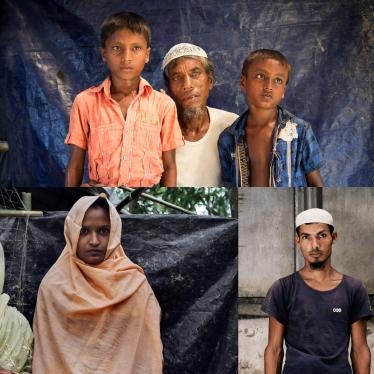(New York) - Nepal’s army and insurgent Maoist forces should demonstrate their commitment to respect human rights, as articulated in their recent peace agreement, by providing accountability for the violations that took place during the decade-long civil war, Human Rights Watch said today.
Human Rights Watch welcomed the November 21 agreement that, if implemented, could end a war that has killed an estimated 13,000 people since it began in 1996, but cautioned that an end to impunity must be at the top of the political agenda.
Nepal’s coalition government and the Communist Party of Nepal (Maoist) signed a comprehensive peace agreement to end more than 10 years of fighting, rewrite the country’s constitution (including whether it will remain a monarchy), and establish an interim government. On Tuesday, the Nepali Army and Maoists agreed to an arms management pact, under which each side would put away most of its weapons and restrict most troops to a few barracks, under the supervision of monitors from the United Nations.
“These agreements are a hopeful step forward for the people of Nepal after years of suffering through repression and civil war,” said Brad Adams, Asia director at Human Rights Watch. “The army and the Maoists should immediately demonstrate their commitment to basic human rights by cooperating with investigations and prosecutions of those responsible for the atrocities of the past decade.”
The peace agreement contains several references to the parties’ respect for human rights, including a commitment by all parties to address issues such as the problems of people whose property has been expropriated, the tens of thousands of internally displaced persons, and compensation for those killed during the conflict. The parties also agreed to provide information about the more than one thousand Nepalis still “disappeared” after being detained by the army or the Maoists.
The army has still not provided information about more than 600 cases of Nepalis who were taken into custody by troops and have not been seen since. The army also engaged in torture and mistreatment of detainees as a matter of practice. Dozens of cases investigated by Human Rights Watch as well as Nepali human rights groups demonstrated that detainees were routinely tortured and mistreated by the army.
Human Rights Watch said that the Maoists were also notorious for severely punishing any Nepalis they deemed as insufficiently committed to their cause, including activists for other political parties and civilians who refused to cooperate with Maoist cadres. Punishments included executions, mock executions, cutting body parts, and severe beatings.
“It is encouraging that the peace agreement explicitly refers to the plight of the disappeared and demands information about their fate, but that’s not enough,” Adams said. “The people of Nepal have consistently demanded justice, including for thousands of people who have suffered lost loved ones or been tortured at the hands of either side. Their voices cannot be ignored now.”
Human Rights Watch said that not a single case of enforced “disappearance” or extrajudicial execution has been adequately investigated by civilian judicial authorities, much less brought to court. Even after the parties ceased hostilities in May, the army has refused to cooperate with investigations instigated by the national police or by monitors from the United Nations Office of the High Commissioner for Human Rights.
The Maoists have in the past claimed they provided accountability through their own “people’s courts,” which have an abysmal record. Most notoriously, the Maoists freed some of those responsible for a 2005 bombing attack in Chitwan, which killed 35 civilians and injured dozens of others, after sentences of two to three months of “corrective punishment.”
The peace agreement calls for the creation of a truth and reconciliation commission without mentioning any judicial or penal measures that may be used to enforce accountability. Section 5.2.5 of the peace agreement states that the truth and reconciliation commission will “probe about those involved in serious violations of human rights and crimes against humanity in the course of the armed conflict and develop an atmosphere for reconciliation in the society.”
The peace agreement envisions a new Nepali army comprising both army troops and Maoist cadres. Human Rights Watch called on the new Nepali government to ensure that the new army did not include any officers or troops responsible for human rights abuses.
Human Rights Watch also called on the new Nepali government to strengthen basic mechanisms for the protection of human rights, such as ensuring the independence of the judiciary and revitalizing the country’s National Human Rights Commission. Both institutions were severely weakened during King Gyanendra’s reign.
“Peace without justice is likely to be illusory,” Adams said. “In Nepal, human rights abusers named by a high-level commission in the early 1990s were those who came back to implement the king’s authoritarian and at times violent rule in 2005. Nepal’s leaders should address the abuses of the past to avoid repeating them in the future.”






